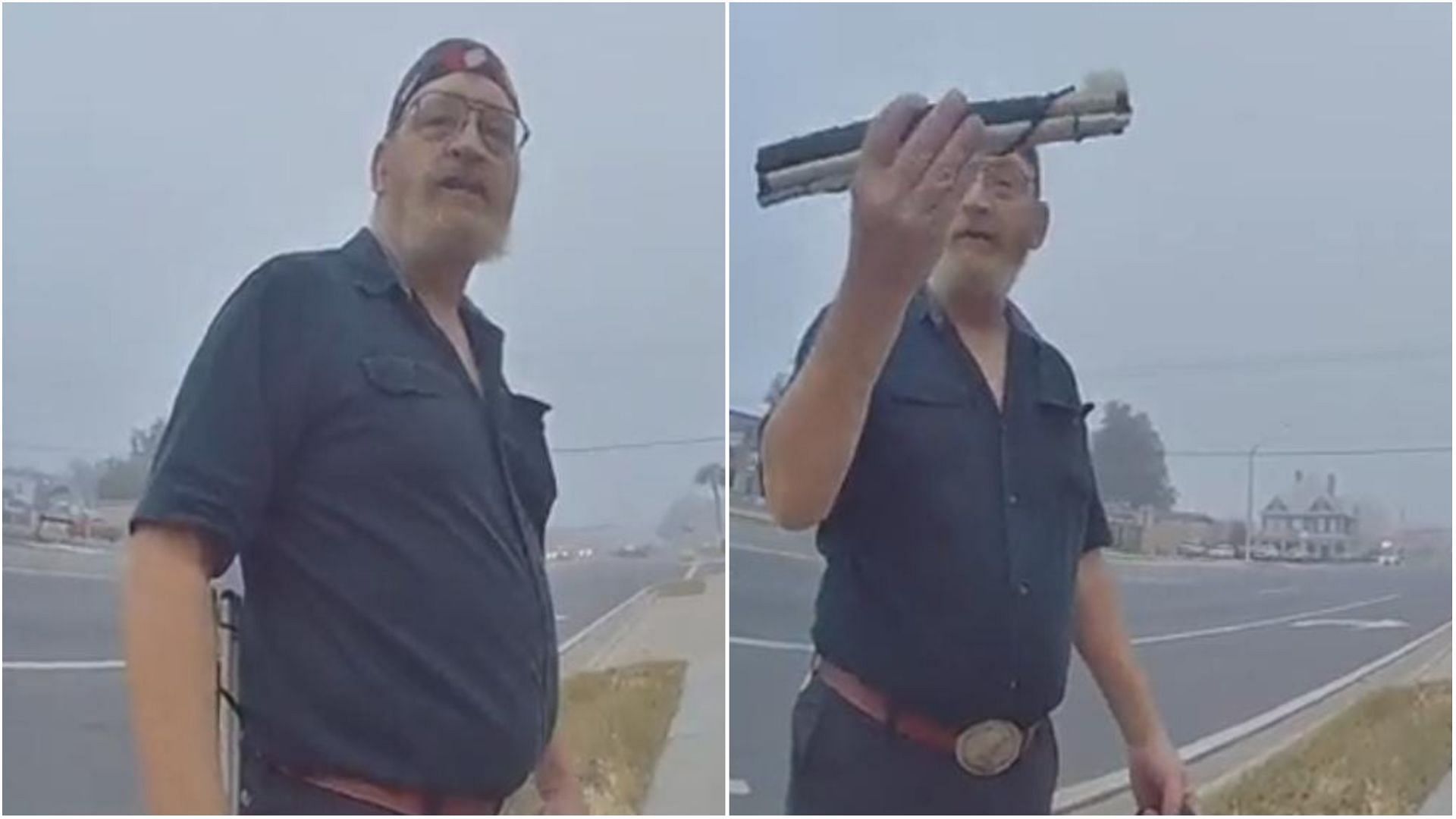Can a routine walk home from jury duty transform into a complex legal battle questioning the integrity of law enforcement practices? The case of James Hodges against the Columbia County Sheriff's Office serves as a stark reminder of the potential for misjudgment and the importance of accountability in policing. The incident, which unfolded on October 31, 2022, in Lake City, Florida, sparked national outrage and ignited discussions about systemic issues within law enforcement agencies.
James Hodges, a 61-year-old legally blind veteran, was arrested while walking home after fulfilling his civic duty as a juror. Deputy Jayme Gohde stopped Hodges, concerned that the folded walking aid he carried in his back pocket resembled a firearm. Despite Hodges explaining his disability and the purpose of the walking aid, the situation escalated, leading to his arrest for resisting an officer without violence. Public scrutiny and outrage followed, prompting the dismissal of the charges on November 7, 2022. However, Hodges, believing his rights were violated, pursued legal action against the Columbia County Sheriff's Office.
| Category | Information |
|---|---|
| Name | James Hodges |
| Age | 61 years old (at the time of the incident) |
| Location | Columbia County, FL (Lake City resident) |
| Occupation | Legally Blind Veteran |
| Incident Date | October 31, 2022 |
| Arresting Officer | Deputy Jayme Gohde, Sergeant Randy Harrison |
| Charges | Resisting an officer without violence (charges later dropped) |
| Lawsuit Filed | November 20, 2023 |
| Defendants | Sheriff Mark Hunter, Deputy Jayme Gohde, Sergeant Randy Harrison |
| Legal Claims | Violation of First and Fourth Amendment rights, wrongful arrest, civil rights violations |
| Damages Sought | Compensatory and punitive damages |
| Court | United States District Court for the Northern District of Florida |
| Case Status | Dismissed on August 26, 2024 but can be appealed. |
| Sheriff's Office Response | Apology, suspension of Deputy Gohde, demotion of Sergeant Harrison, policy reviews |
| Legal Representation | Paul Morris of the Law Offices of Paul (Information gathered from news reports) |
| Reference Website: | FindLaw - https://www.findlaw.com (For general legal information and case opinions) |
On November 20, 2023, Hodges officially filed a lawsuit in the United States District Court for the Northern District of Florida against Sheriff Mark Hunter, Deputy Jayme Gohde, and Sergeant Randy Harrison. The lawsuit alleged violations of Hodges' rights under the First and Fourth Amendments, among other charges. Hodges claimed that the officers violated his civil rights by stopping, detaining, and arresting him despite his clear explanation of his disability and the purpose of his walking aid. The lawsuit suggests that the incident was not an isolated mistake but rather symptomatic of systemic issues within the Columbia County Sheriff's Office.
- New Desi Mms Your Ultimate Guide To Trending Digital Entertainment
- Hd Hub 4u Movie Your Ultimate Destination For Highquality Entertainment
Hodges seeks both compensatory and punitive damages. Compensatory damages aim to cover the actual losses incurred, such as emotional distress, legal fees, and financial burdens. Punitive damages, conversely, are intended to punish the defendants for their alleged misconduct and deter similar behavior in the future. The Columbia County Sheriff's Office responded with a series of measures, including Sheriff Mark Hunter issuing a public apology to Hodges and the community. Hunter suspended Deputy Jayme Gohde and demoted Sergeant Randy Harrison. Additionally, the sheriff's office initiated a review of its policies and procedures to prevent similar incidents.
Despite these actions, Hodges' legal team argues that these measures are insufficient to address the underlying problems within the sheriff's office. They contend that the incident was not merely the result of individual errors but a consequence of inadequate training, flawed policies, and a lack of understanding regarding the rights of individuals with disabilities. The lawsuit aims to compel the sheriff's office to implement meaningful reforms to protect the rights of all citizens.
The case has garnered significant media attention, with viral videos of the arrest sparking outrage on social media. Many criticized the deputy's actions, questioning why Hodges was arrested for carrying a cane. The incident has raised broader questions about police interactions with individuals with disabilities and the need for improved training and awareness among law enforcement officers. Legal filings indicate that the case proceeded through the standard stages of civil litigation, with Filing 7 including a notice of a related action per local rule 1.07(c) by James Hodges and Filing 6 containing a notice of local rule 3.02(a)(2).
- Movierulz Name Your Ultimate Guide To Streaming And Downloading Movies
- Why Vega Movies Com Is A Mustvisit For True Movie Enthusiasts
LEO Ratings, an organization evaluating law enforcement agencies, reportedly reached out to Hodges' lawyer for more information on the case, suggesting its implications extend beyond local concerns. First Coast News reported that Hodges had made a formal complaint and planned to file a lawsuit following the incident. David Matthews of the New York Daily News also covered the story, highlighting the sheriff's apology after deputies mistook the cane for a gun and arrested the legally blind man.
The District Court of Appeal of Florida, Fourth District, is involved, with a case titled "James Hodges, appellant, v." This indicates that the case may have been appealed or reviewed by a higher court. Information regarding the case can be found on legal websites like FindLaw, offering details about legal arguments and the court's reasoning.
Residents of Lake City rallied in support of Hodges, organizing gatherings and protests to demand justice and raise awareness about police misconduct and disability rights. Hodges himself emphasized the importance of standing up for one's rights and holding those in power accountable. In a statement, he said, "The only way to drive away darkness is to turn the lights on," encapsulating the spirit of his lawsuit and his determination to seek justice.
Deputy Jayme Gohde and her supervisor were initially suspended after arresting James Hodges, according to Columbia County Sheriff Mark Hunter. The sheriff stated that the arrest was unacceptable and that the deputies would face disciplinary action. While this response was seen by some as a step in the right direction, others argue that it does not address the systemic issues within the department. Hodges' lawyer filed an intent to sue the sheriff's office, signaling the beginning of the legal battle. The lawsuit claims that the incident was a result of a policy or practice within the Columbia County Sheriff's Office, suggesting it was not an isolated mistake but a consequence of systemic problems.
The interaction between Hodges and the deputies began when a deputy stopped him, concerned that he was carrying a gun in his back pocket. Despite Hodges showing the deputy that he was carrying a foldable cane, the interaction continued, and a sergeant ordered a deputy to arrest Hodges. This series of events raises questions about the deputies' judgment and their understanding of the rights of individuals with disabilities. The video of the incident, showing the deputy forcefully holding Hodges, has been widely circulated, fueling public outrage.
The case of James Hodges is a complex and multifaceted legal battle that raises important questions about police accountability, disability rights, and the role of law enforcement in society. The outcome could have significant implications for the Columbia County Sheriff's Office and law enforcement agencies nationwide. Despite the initial lawsuit filing, recent developments indicate a shift in the legal landscape. On August 26, 2024, the civil lawsuit was dismissed. While this may appear to be a setback for Hodges, it is important to understand the nuances of the legal process. Dismissal does not necessarily mean the end of the road, as Hodges retains the right to appeal the decision.
The reasons for the dismissal are currently unclear from available information but could range from procedural issues to a judge's assessment of the merits of the case. The dismissal adds another layer of complexity to the already intricate narrative surrounding the James Hodges lawsuit. The case underscores the importance of addressing systemic issues within law enforcement agencies and highlights the need for improved training and awareness regarding the rights of individuals with disabilities. As the legal battle continues, the case serves as a reminder of the ongoing struggle for justice and accountability in law enforcement.
Connections to broader societal trends and celebrity involvement can be drawn. For instance, celebrities such as Colin Kaepernick, who has been a vocal advocate for police reform, and advocacy groups like the ACLU have expressed interest in similar cases. The James Hodges case aligns with the growing movement for police accountability and reform, echoing the sentiments of activists and influencers across the country. The case also mirrors discussions surrounding other high-profile incidents involving individuals with disabilities, highlighting the urgent need for systemic change in law enforcement practices.
The societal impact of the James Hodges case extends beyond legal proceedings, influencing public perception of law enforcement and disability rights. It prompts discussions about the intersection of civil rights, police conduct, and the rights of individuals with disabilities. As the case progresses, it serves as a catalyst for change, encouraging law enforcement agencies to reevaluate their practices and implement reforms to protect the rights of all citizens. The James Hodges lawsuit is not just a legal battle but a symbol of the ongoing struggle for justice and equality in society.
- Noarmsgirl Leak The Full Story Behind The Viral Sensation
- Sydney Sweeney Deepfake Porn The Truth Behind The Viral Sensation


